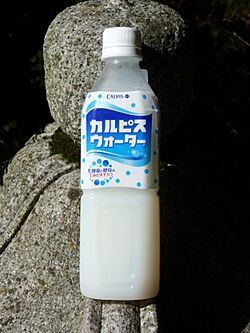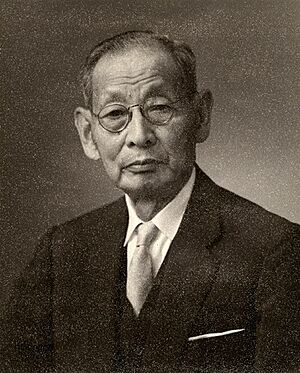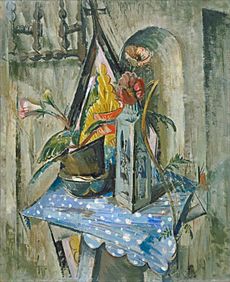Calpis facts for kids

A bottle of Calpis Water
|
|
| Type | Concentrate |
|---|---|
| Inventor | Kaiun Mishima |
| Inception | 1919 |
| Manufacturer | Calpis Co., Ltd. |
| Website | Lua error in Module:WikidataIB at line 168: attempt to index field 'wikibase' (a nil value). |
|
Native name
|
カルピス株式会社
|
|---|---|
|
Romanized name
|
Karupisu Kabushiki-gaisha |
| Subsidiary | |
| Industry | Soft drinks |
| Founded | April 1916 |
| Founder | Kaiun Mishima |
| Headquarters | , |
| Parent | Asahi Breweries |
Calpis (called Calpico in North America) is a popular Japanese drink. It's a non-fizzy soft drink made by Calpis Co., Ltd., which is part of Asahi Breweries. The company is based in Shibuya, Tokyo, Japan.
Calpis has a light, slightly milky, and a bit sour taste. People often say it tastes like plain or vanilla-flavored yogurt or Yakult. It's made from water, dry milk, and lactic acid. It gets its special taste through a process called lactic acid fermentation, which uses good bacteria.
You can buy Calpis as a concentrate, which means you mix it with water or sometimes milk before you drink it. There are also ready-to-drink versions like Calpis Water (not fizzy) and Calpis Soda (fizzy). Calpis is also used to flavor shaved ice (called kakigōri) and in some mixed drinks.
Contents
The Story of Calpis
The creator of Calpis was a man named Kaiun Mishima. In 1902, he traveled to Inner Mongolia. There, he discovered a traditional drink made from cultured milk called airag. This drink had a unique flavor because of lactic acid, which comes from special bacteria. Mishima found that drinking airag helped his digestion. This experience gave him the idea to create his own version of a healthy, cultured milk drink.
Early Attempts
Mishima first tried to make a drink called Daigomi in 1916. It was made by culturing cream with lactic acid bacteria. But this didn't work well for making a lot of it. There was also too much skimmed milk left over.
Next, he created Daigoso by culturing skimmed milk. However, this product didn't sell well. His last try before Calpis was Lacto Caramel, a candy with live lactic acid bacteria. This also failed because it melted easily in the summer.
How Calpis Was Born
Calpis was actually created by accident! Mishima added sugar to his Daigoso mixture and left it overnight. The result was a delicious new drink. Calpis was officially launched on July 7, 1919.
People quickly loved Calpis because it was economical to mix the concentrate with water. It became very popular with the slogan "the taste of first love." At first, Calpis was seen as a special drink for gifts or important events. It wasn't until around 1965 that it became a common drink in homes.
New Flavors and Products
Over the years, Calpis added new flavors. Orange-flavored Calpis came out in 1958. Pineapple and grape flavors followed two years later. A fizzy version, Calpis Soda, was released in 1974.
In 1991, the ready-to-drink Calpis Water became very popular. Over 20 million cases were sold in its first year! Around this time, the company also started using paper and plastic bottles for their products.
The Name Calpis
Mishima wanted the name of his new drink to sound special. His earlier products, Daigomi and Daigoso, were named after "daigo." This Japanese word means the best of all flavors in Buddhism.
For Calpis, Mishima first thought of "Calpir," combining "cal" from calcium and "pir" from a Sanskrit word related to "daigo." But after talking to a musician and a Buddhist priest, he chose "pis" from the Sanskrit word "sarpiṣ" instead.
In North America, the drink is sold as Calpico. This name change was made to avoid sounding like a rude English word.
Calpis Packaging
The classic Calpis packaging used to have white dots on a blue background. In 1953, the colors were switched to blue dots on a white background. This design was meant to look like the Milky Way galaxy. It was a nod to the Japanese Tanabata festival, which celebrates stars.
Changing the Logo
In 1919, Calpis held an international poster contest. This contest helped European artists who were struggling after World War I. A German painter named Otto Dünkelsbühler won third place.
In 1923, Calpis started using a new logo based on his design. It showed a drawing of a man drinking from a glass. Over time, this logo was seen as disrespectful to people. Because of this, the company first reversed the colors of the logo. Then, in January 1990, they removed the logo completely. A 12-year-old boy named Futoshi Arita, who was part of a group working against unfair treatment, helped bring attention to the issue.
See also
 In Spanish: Calpis para niños
In Spanish: Calpis para niños
- Actimel
- Fermented milk products
- List of fermented foods
- Milkis
- Pocari Sweat
- Wahaha
 | Charles R. Drew |
 | Benjamin Banneker |
 | Jane C. Wright |
 | Roger Arliner Young |



